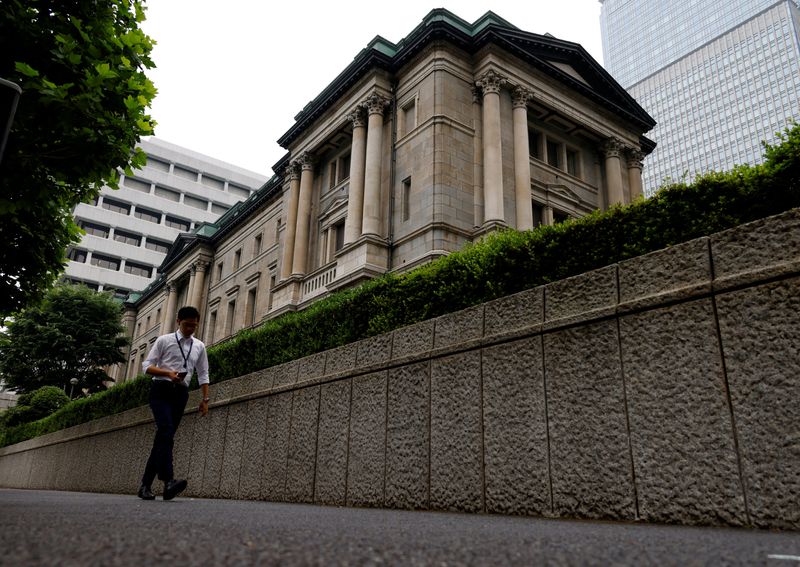By Leika Kihara
TOKYO (Reuters) -Bank of Japan (BOJ) policymakers saw the need to keep ultra-low interest rates but discussed growing prospects that higher wages could finally eradicate the risk of a return to deflation, a summary of opinions at their December meeting showed.
Their increasing attention to mounting inflationary pressures could keep alive market expectations the BOJ will phase out dovish Governor Haruhiko Kuroda's massive stimulus when he steps down in April next year.
"Price rises are accelerating not just for goods but for services ... There's a chance Japan's inflationary momentum is heightening," one member was quoted as saying in the summary, released on Wednesday.
At the Dec. 19-20 meeting, the BOJ kept its ultra-easy policy but shocked markets with a surprise tweak to its bond yield control that allows long-term interest rates to rise more.
Several in the nine-member board said the decision was aimed at making the current stimulus programme more sustainable by addressing its side-effects, rather than a step toward ending ultra-loose monetary policy, the summary showed.
But discussions at the board delved into signs of change in Japan's price outlook that could lay the groundwork for a withdrawal of stimulus when Kuroda departs next year.
While some in the board said Japan has yet to sustainably hit the central bank's 2% inflation target, others saw signs of change in companies' prolonged aversion to raising wages and prices.
"Consumer prices are approaching a state seen before Japan's deflationary period," one member said, pointing to the growing ratio of items seeing prices rise. "This could be a sign of progress toward achieving a situation where Japan won't return to deflation," the member said.
"There is a chance that relatively high wage increases will be achieved in Japan" on robust corporate profits and a growing number of firms keen to beat intensifying labour shortages with higher pay, another opinion showed.
Some in the BOJ also warned of the growing side-effects of prolonged easing, which drove it into widening the band set around the 10-year bond yield target this month.
"Bond market functions have deteriorated. If this situation persists, it could hamper the transmission of monetary easing" by discouraging firms from issuing bonds to raise funds, one member was quoted as saying.
Were the BOJ to exit ultra-easy policy, it must examine any risks associated with rising borrowing costs and whether investors - long accustomed to low interest rates - would be prepared for the move, another opinion showed.
Wage growth is seen as key to how soon the BOJ could raise its yield curve control (YCC) targets, which are set at -0.1% for short-term rates and around 0% for the 10-year bond yield.
The BOJ's relentless bond buying to defend the yield cap has drawn increased criticism for distorting market pricing and causing an unwelcome yen fall that boosted the cost of importing already expensive raw materials.
While core consumer inflation hit a four-decade high of 3.7% in November, Kuroda has dismissed the chance of a near-term rate hike on the view price rises were driven by raw material costs, rather than strong demand.
Analysts expect the BOJ to raise its inflation forecasts in its fresh quarterly growth and price outlook, set for release after the bank's next policy meeting on Jan. 17-18.
